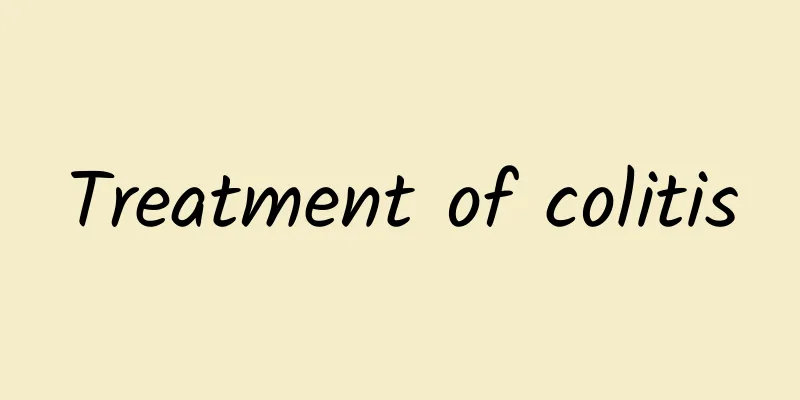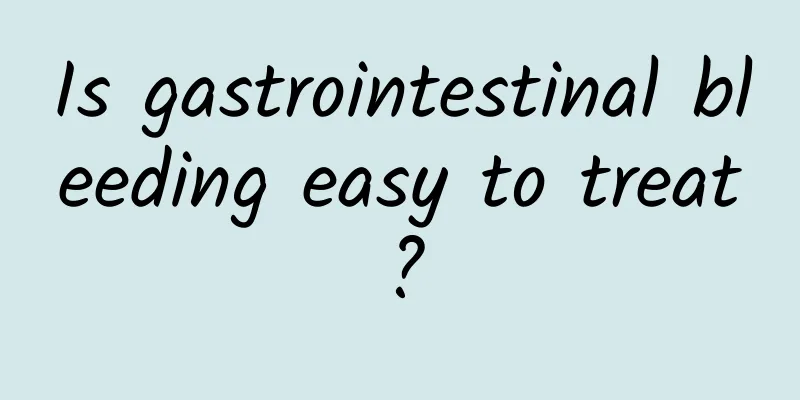Treatment of colitis

|
Colitis is a very common disease in clinical practice. There are many factors causing the disease. It may be genetic, it may be due to one's own immune disease, or it may be caused by mental factors. Colitis may cause diarrhea or even constipation, and one may not be able to go to the toilet for several days. Therefore, no matter how serious the colitis is, one should go to the hospital for examination and treatment as soon as possible. So what are the treatments for colitis? The harm caused by colitis is very serious. Generally, people with colitis will suffer from loss of appetite, diarrhea, stomach pain, general weakness, etc. Although the onset is relatively slow, it is difficult to treat and generally recurs. How to treat colitis? (1) Diet: Get enough rest and avoid fatigue and excessive mental stress. Give less irritating, easy to digest, nutritious food, try to avoid foods containing rough fiber, and temporarily stop eating milk and dairy products. Appropriately replenish fluids and electrolytes, and supplement vitamin B and calcium. Take iron supplements and folic acid to treat anemia. Patients with severe illness, frequent diarrhea, and severe malnutrition can be given a period of gastrointestinal elemental diet or parenteral nutrition. (2) Anti-infective drugs: Salicyloylsulfapyridine is effective in treating various types of colitis and preventing complications. Some cause nausea, vomiting, headache, rash, granulocytopenia, anemia and poor liver function. If it is ineffective or has adverse reactions, metronidazole can be used instead. Neomycin and phthalidazole are also effective. (3) Hormone therapy: Adrenal cortical hormones, hydrocortisone and prednisone can improve the general condition, relieve the course of the disease, reduce the frequency of defecation, alleviate recurrent symptoms and increase appetite. However, the effect is not good for some patients, and it may cause ulcer perforation, bleeding and slow healing. It is now believed that the scope of application is small. It can significantly alleviate symptoms and improve the condition of patients with acute outbreaks or severe early attacks. However, the effect is not satisfactory for long-term recurrent attacks. The corticotropin unit is dissolved in glucose solution and dripped intravenously. After the symptoms improve, it is switched to intramuscular injection. Hydrocortisone can be given intravenously, and the dosage can be gradually reduced after symptoms are relieved. Corticosteroids are better than cortisone in relieving symptoms, but are not as effective as cortisone in maintaining relief. This treatment should not be continued for more than 2 weeks if there is no improvement in symptoms. (4) Immunosuppressants: Azathioprine, once daily, can change the course of the disease and suppress clinical manifestations, but cannot change the underlying disease. It is often used during the quiescent phase to reduce relapses, but it may also cause poisoning, so caution should be exercised. 6-Mercaptopurine (6-MP) combined with hormones can alleviate symptoms. (5) Antidiarrheal drugs: They can reduce the frequency of bowel movements and relieve abdominal pain. Commonly used drugs include compound phenoxylate, codeine, and compound camphor tincture. Antidiarrheal drugs may cause toxic megacolon in acute ulcerative colitis and should be used with caution. Sedatives and antispasmodics may also be given. (6) Retention enema: commonly used for rectal and sigmoid colitis, it can relieve symptoms and promote ulcer healing. (7) Treatment with Chinese medicine: The fundamental treatment method should be to strengthen the spleen and kidney, invigorate qi and remove dampness, and to clear away heat and detoxify, and to promote blood circulation and remove blood stasis. Treatment should be based on syndrome differentiation. Long-term use of extremely bitter and cold medicines is most avoided. It can also be combined with intravenous drips such as Chinese medicine injections to strengthen the body. Chang'an Herbs (t. Baoyou) made from nutmeg, amomum villosum, hawthorn, polygonatum, sea buckthorn, longan meat, yam, ginseng, coptis root, psoralea corylifolia, etc. It can eliminate symptoms such as lower abdominal pain, bloody stools and diarrhea, restore bowel movements to normal, enhance the body's immunity, strengthen the body, and prevent recurrence. Usage and dosage: 3 grams at a time, 3 times a day, take with warm water before meals. There are many causes of colitis, and we need to find out the causes and treat them symptomatically. There are also many treatments for colitis, but authoritative doctors recommend the use of traditional Chinese medicine, which has no side effects and can cure both the symptoms and the root cause. In our daily life, we need to develop a healthy lifestyle, avoid overeating, and avoid being addicted to spicy food to prevent the occurrence of colitis. |
<<: Prevention of tuberculosis
>>: Abdominal pain and no menstruation
Recommend
Is it good to wash your hair too much?
Regular and moderate hair washing is very benefic...
What to do if you have high cholesterol?
The level of cholesterol in the blood directly af...
The process of detoxification by taking Chinese medicine for eczema
For recurring eczema, Chinese medicine can be use...
How long should I apply dandelion to my breasts?
We often see dandelions in our daily lives. Since...
Symptoms of facial dermatitis
With the improvement of living standards, people ...
Treatment for small cell lung cancer
Small cell lung cancer is actually a common type ...
Headache after washing
If you have a headache after washing your hair, y...
Why do teenagers feel pain in their knees when they squat?
If teenagers experience pain in their knees when ...
Does it hurt to open your eyes?
Canthoplasty surgery is a method most commonly ch...
What causes swollen cheeks?
Many people may not know what organ is secreting ...
High bile acid
Many friends will find that they have high bile a...
What are the magical effects of Baizhu Fuling Decoction
Baizhu Fuling Decoction is a well-known Chinese m...
The best way to treat tinea pedis, traditional Chinese medicine remedies to say goodbye to athlete's foot
Tinea pedis, which is commonly known as athlete&#...
What are the symptoms of spleen and kidney yin deficiency?
Kidney deficiency is a long-standing topic among ...
Lump on the neck
Many people do not pay much attention to their ow...









